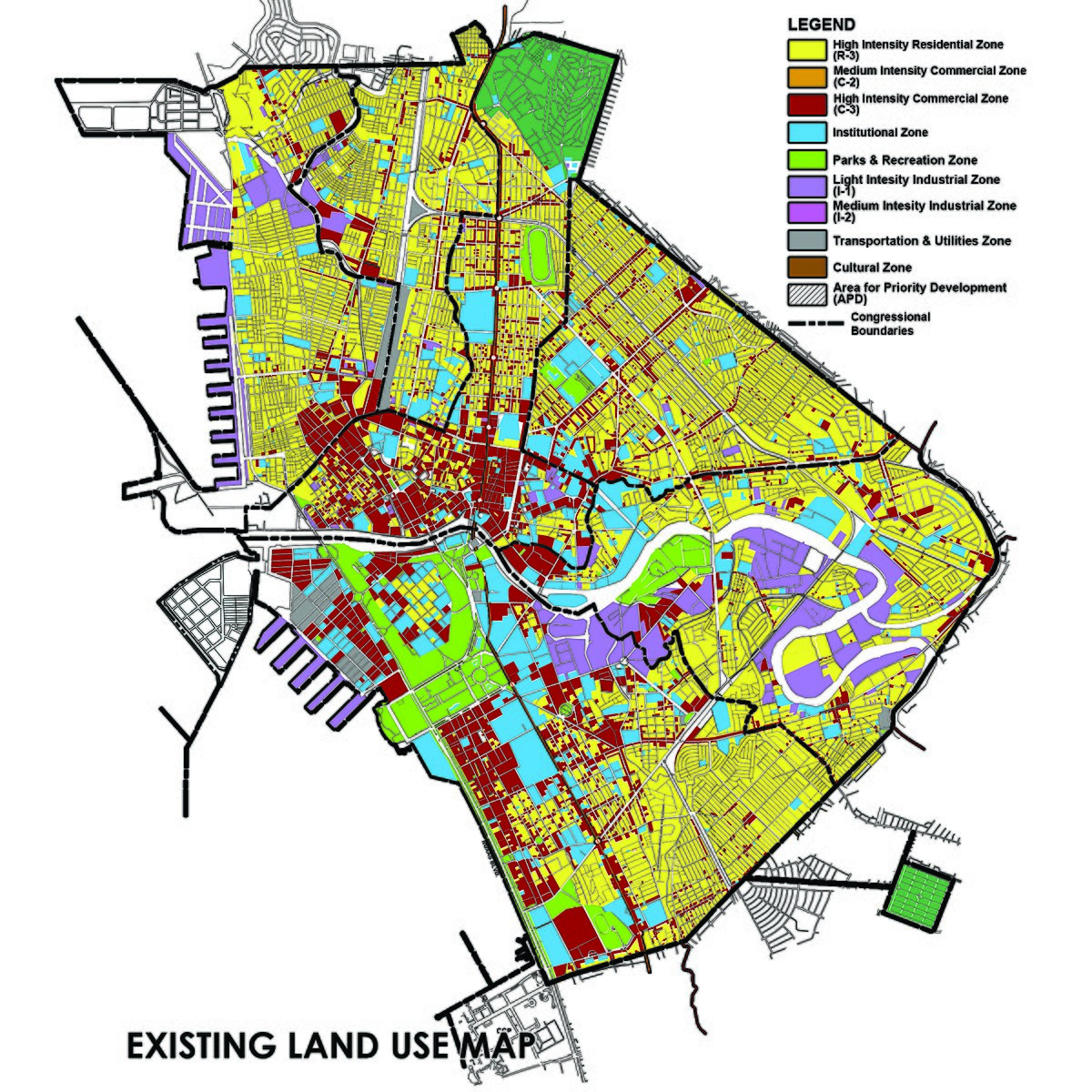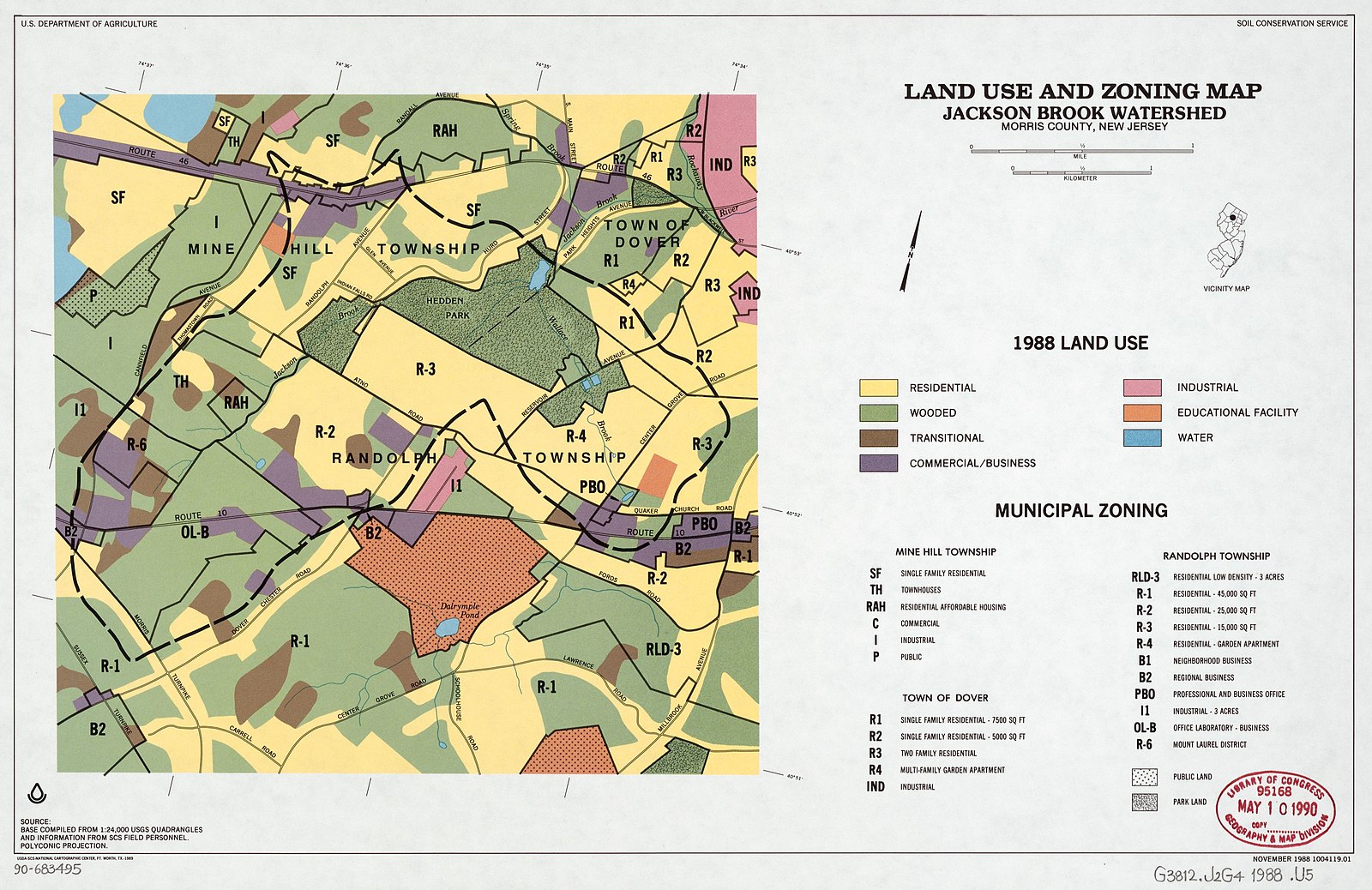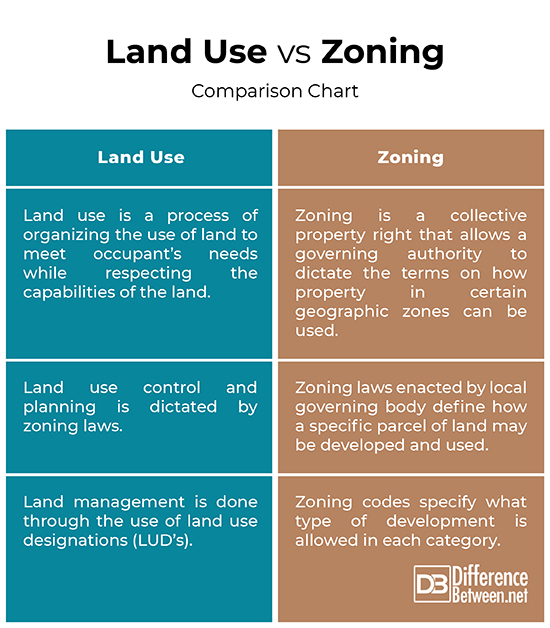Difference Between Land Use and Zoning
Land use issues are an important part of every real estate transaction. The land use control in your area significantly influence the way you conduct your real estate business. But what does land use actually mean and what is its significance? When you own a real estate property such as a land or a building, the first thing that probably comes to mind is the question of surface rights. The rights to exclude others and prevent others from interrupting your enjoyment of your property are fundamental rights. In order to protect and respectfully obey these rights, land use planning and zoning come into play.
Land use, as the name suggests, is associated with planning, control, and rights of property. Land use is a generic term and its meaning is often contextual. Land use control and zoning in particular are very important to our everyday lives. So what do we mean by zoning? Zoning is the allocation of land in a municipality by dividing them into different zones. Zoning can be considered as a collective property right, but it is not formally recognized as such. In fact, zoning and land use controls have a greater influence on the use and development of real estate. We break down some key points to clarify the significant differences between the two.
What is Land Use?
Land use is a generic term without a universal definition. Land use may refer to many things; it may refer to buildings or the occupants, it may refer to the questions pertaining to the occupancies of the land, and it may also refer to the kind of activities occur on the land. Land use simply refers to the function of land, particularly what it’s being used for. Land use is a process of organizing the use of land to meet occupant’s needs while respecting the capabilities of the land. Previously, land use planning was limited to merely the existing uses of the land. As the use of land gets more complicated, land use planning becomes more sophisticated.
What is Zoning?
Zoning is the division of a municipality or community into different districts and zones in which certain activities are prohibited and others are permitted. Zoning is actually a planning control tool and the way governments regulate the physical development of land based on its usage, purpose, geology, etc. It is the regulation and restriction of land uses based on a pre-determined plan. It defines the rules that govern what and where people and institutions can and cannot build in our cities, suburbs, and towns. Zoning tells us how tall our houses can be and how far our houses need to be away from the street. The purpose of zoning is to protect and conserve the value of land use.
Difference between Land Use and Zoning
Definition
– Land use is a process of organizing the use of land to meet occupant’s needs while respecting the capabilities of the land. Land use planning balances private property rights with the desired community character.
Zoning defines the rules and laws governing what and where people and institutions can and cannot build in our cities, suburbs and towns. Zoning is actually a planning control tool and the way governments regulate the physical development of land based on its usage, purpose, geology, etc. Land use control and zoning in particular are very important to our everyday lives.
Designations
– Land management is done through the use of land use designations (LUD’s). Land use designations specify ways of managing an area of the land and the resources it contains. LUD’s emphasizes on certain resources or combination of resources. The LUD’s are assigned or allocated to specific areas of land corresponding to compatible zoning districts.
Zoning designations define the regulations and laws to control the development of property and how it should be used. Zoning is a collective property right that allows a governing authority to dictate the terms on how property in certain geographic zones can be used.
Classification
– There is no ideal classification of land use as there is considerable diversity of opinion about what constitutes land use. There are primarily six types of land use including agricultural land, recreational land, transport land, urban land, forest land, and commercial land.
Zoning, on the other hand, are typically classified into four major types: performance zoning, incentive zoning, and intensity zoning. Local governing authorities have a great deal of flexibility in how their zoning codes are used to regulate the development of land.
Purpose
– Zoning is the most common form of land use regulation used by authorities to regulate and control the development of land within their borders. Zoning laws enacted by local governing body define how a specific parcel of land may be developed and used. Zoning laws place restrictions on the extent to which a land may be developed.
Land use plans and zoning are often assumed to be the same thing. However, they are distinct elements that serve different purposes for the planning and development of cities.
Land Use vs. Zoning: Comparison Chart
Summary of Land Use vs. Zoning
Land use plans and zoning are often assumed to be the same thing. However, they are distinct elements that serve different purposes for the planning and development of cities. Land use, as the name suggests, is associated with planning, control, and rights of property. Zoning, on the other hand, is the allocation of land in a municipality by dividing them into different zones. The purpose of zoning is to protect and conserve the value of land use.
- Difference Between Caucus and Primary - June 18, 2024
- Difference Between PPO and POS - May 30, 2024
- Difference Between RFID and NFC - May 28, 2024
Search DifferenceBetween.net :
Leave a Response
References :
[0]Hirt, Sonia. Zoned in the USA: The Origins and Implications of American Land-Use Regulation. Ithaca, New York: Cornell University Press, 2015. Print
[1]Fischel, William. The Economics of Zoning Laws. Baltimore, Maryland: Johns Hopkins University Press, 1987. Print
[2]Burke, Barlow Jr.. Understanding the Law of Zoning and Land Use Controls. New York: LexisNexis, 2013. Print
[3]Image credit: https://commons.wikimedia.org/wiki/File:Land_use_and_zoning_map,_Jackson_Brook_watershed,_Morris_County,_New_Jersey_LOC_90683495.jpg
[4]Image credit: https://en.wikipedia.org/wiki/File:Existing_Land_Use_Map_of_Manila_2017.jpg



